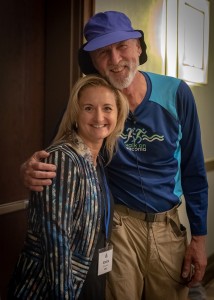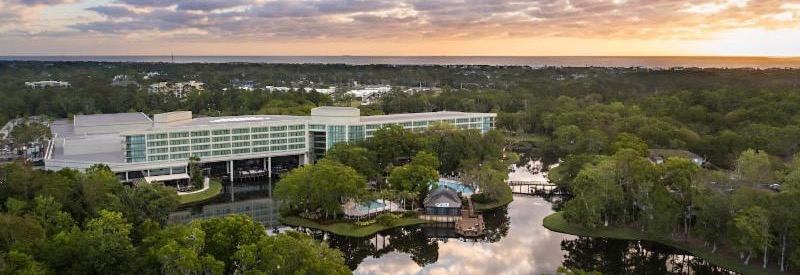INTRODUCTION
Summer Think Tank Proceedings Now Available!
“No one ever made a decision because of a number. They need a story.”
–Daniel Kahneman, as quoted by Michael Lewis in “The Undoing Project”
 During last month’s Summer Think Tank event, Dr. Paul Terry encouraged the 80 HERO members and guests convened in Edina, MN, and the additional two dozen or so joining virtually via webinar to read Daniel Kahneman’s book “Thinking Fast and Slow” for an in-depth understanding of how people use information to influence decision making. As a precursor to that dense tome, I picked up Michael Lewis’ 2017 account of Daniel Kahneman’s early research with Amos Tversky on data-driven decision making in “The Undoing Project.” The quotation above was a reflection by Kahneman as he wondered why the probability statistics he shared with Israeli government officials hadn’t resulted in the behaviors or actions expected during a time of imminent conflict with Syria.
During last month’s Summer Think Tank event, Dr. Paul Terry encouraged the 80 HERO members and guests convened in Edina, MN, and the additional two dozen or so joining virtually via webinar to read Daniel Kahneman’s book “Thinking Fast and Slow” for an in-depth understanding of how people use information to influence decision making. As a precursor to that dense tome, I picked up Michael Lewis’ 2017 account of Daniel Kahneman’s early research with Amos Tversky on data-driven decision making in “The Undoing Project.” The quotation above was a reflection by Kahneman as he wondered why the probability statistics he shared with Israeli government officials hadn’t resulted in the behaviors or actions expected during a time of imminent conflict with Syria.
Kahneman’s research is especially relevant to our June 19 Summer Think Tank discussion on how we might more effectively use data to engage leaders at all levels of an organization, while also informing ongoing process improvements to our health and well-being efforts. A core theme that emerged from the day was the necessity of not only focusing on the right data points, but also bringing it into context so stakeholders can draw meaning from it. While the day’s panels and discussions did identify specific types of data that are important to different types of stakeholders within an organization, it was the stories they shared that captivated my attention.
I am filled with gratitude for the 16 panelists and discussion facilitators that shared their stories of making meaning out of data for the stakeholders in their organizations. Equal appreciation is extended to my HERO colleagues for supporting the day logistically and contributing to the published Proceedings from the meeting. HERO members can access Think Tank Proceedings along with slide presentations, meeting materials, and recordings by accessing the members-only Think Tank General Library on the HERO members’ website.
We are intentionally limiting our recommended reading in this month’s briefs in favor of encouraging you to get “the rest of the story” on Summer Think Tank Proceedings. See below for more information about HERO’s upcoming events and a HERO member profile.
UPCOMING EVENTS
HEROForum18
From the C-Suite to the Shop Floor: Well-being for All
October 2-4, 2018 | Sawgrass Marriott Golf Resort & Spa, Ponte Vedra Beach, FL

Have you heard? The Forum website has a new look this year, making it easier to access everything you want to know about the sessions, speakers, tracks and overall agenda. We’ve added a lot of content in recent weeks, so stop by for a virtual visit when you have a minute and then bookmark it for future visits as we continue to add new faces and activities.
In the weeks ahead we will release the general session keynote speakers and panelists. Also, stay tuned for the agendas for the Healthcare Summit and University Summit. Both pre-conference offerings will occur on Monday, October 1, from 8 am to 1 pm, and require separate registration.
Things to Do
✔ Bookmark HEROForum18 WEBSITE
✔ REGISTER for HEROForum18
✔ RESERVE your room at the Sawgrass Marriott
HERO Fall Think Tank
The Intersection of Financial Well-being and Mental Health
October 1, 2018 | Sawgrass Marriott Golf Resort & Spa, Ponte Vedra Beach, FL
The movement from wellness to well-being has been, at its heart, a shift from a human deficits orientation that focused on reducing health risks and managing disease to an assets-based model that appreciates individual autonomy and aspirations and fosters human performance. In practice, this shift has been ushered in by more workplace initiatives intent on building a supportive culture and social connectivity. Though the need for health coaching for stress, healthy eating and smoking cessation has not abated, we are also seeing ever more programs that teach mindfulness, financial well-being and resiliency. Review the teachings about dualism from the likes of Aristotle and René Descartes and you are reminded that the connection between mind and body are far from new concepts. Nevertheless, are employers and workplaces poised to do like the Greek and French philosopher-scientists did and foster a seamless integration between their occupational health and mental health initiatives?
Informal interviews with HERO members and study committees over the past months show that worksite health promotion leaders fully appreciate the profound intersection between financial well-being and mental health. Nevertheless, we are at the nascent stages of an inclusive approach that treats this busy intersection as a place where strategic planning, data collection and program evaluation should reside. In this HERO Think Tank, we will crosswalk carefully through this perilous intersection, and in our usual Hegelian dialectic fashion we will conjure and debate various theses and antitheses relating to money and emotions. We will ask how financial well-being initiatives can be tailored to address the famine of savings in America as well as confront the mental strain that is eroding American resiliency and productivity. Most decidedly, we will structure this half day to equip HERO members with ideas and actionable approaches to walking into this intersection with confidence and with eyes wide open about the grand possibilities on the other side.
HERO WEBINARS
What’s Your Mountain?
Wednesday, August 15, 2018 – 12 p.m. CDT
With Guests: Jennifer Bruno, vice president of Global Health Services, Johnson & Johnson, and Jack Groppel, PhD, co-founder of Johnson & Johnson Human Performance Institute
Jennifer Bruno and Jack Groppel were tested when climbing the largest mountain on the African continent. From the known challenges they planned for to the unknown events they could never have imagined, their human spirit was tested. The goal was to summit Mount Kilimanjaro and return safely. But with any goal in life, what lies in the purpose is what really makes the journey. This webinar shares insights they learned while climbing Mount Kilimanjaro, offering applications to overcoming life’s challenges. Register now online.
HERO RECOMMENDS
Resources and Readings
Deadline is Aug. 9 for Hearst Health Prize
High achievers in the field of population health management have until 3 p.m. EDT Aug. 9 to apply for the $100,000 2019 Hearst Health Prize for Excellence in Population Health.
The prize, offered by the Jefferson College of Population Health, is intended to identify and promote promising ideas in the field that help to improve health outcomes, and to proliferate best practices more rapidly. Submissions are reviewed by a distinguished interdisciplinary panel of judges who will determine whether the program has made a measurable difference in health outcomes and/or health behaviors.
Finalists for the prize will have an opportunity to present their project during a special poster session at the Population Health Colloquium March 18-29, 2019, in Philadelphia. The winner will be announced during the opening session of the Colloquium March 19. In addition to the $100,000 winner, up to two finalists will each receive a $25,000 cash award.
For more information on the Hearst Health Prize, visit Jefferson.edu/HearstHealthPrize or email HearstHealthPrize@Jefferson.edu.
MEMBER PROFILE
 Karen Schmidt, MPH
Karen Schmidt, MPH
Throughout 2018, each edition of HERO Briefs will include a member profile with answers to three questions we believe will interest HERO members.
Our July member profile features Karen Schmidt, associate director, wellness and health culture at MHealthy, University of Michigan.
Q. What is a key focus for your health and well-being initiatives in the coming months?
A. The key focus for our health and well-being initiatives in the coming months includes a focus on chronic conditions, specifically: diabetes, back pain, depression/anxiety, hypertension and cancer (breast and skin). We are also prioritizing how we can better address and implement strategies around the social determinants of health, with a specific focus on supporting our low wage workers. Finally, we have a commitment to diversity, equity and inclusion and are exploring ways we can be more inclusive from a programming and communications perspective.
Q. What’s a new professional resource (i.e. websites, measures, tools, books) you’ve found useful for improving your efforts?
A. I love the tools and resources from the University of Michigan’s Center for Positive Organizationsat the Ross School of Business.
The Center is a world-class research center that brings transformational research to students and leaders through articles, books, events, tools, teaching, and organizational partnerships. Since 2002, the Center has been the hub of research on Positive Organizational Scholarship. Their domains of research are Positive Culture, Positive Ethics and Virtues, Positive Leadership, Positive Meaning and Purpose, Positive Practices, and Positive Relationships in an organizational setting.
The Center’s mission, “To inspire and enable leaders to build high-performing organizations that bring out the best in people. We are a catalyst for the creation and growth of positive organizations,” really resonates with me. There is much overlap, synergy, and lessons to be learned from the great work that the Center does and the work that we do to create positive cultures of health within our employee population.
The Center has a terrific speakers series, as well as an incredible, annual Positive Business Conference. And, they also offer some amazing resources through their online store. One of my favorite new tools that I’ve been trying out is their Positive Leadership™: The Game card set. It is an interactive card game designed for leaders of all levels that helps you generate innovative solutions to business problems through structured brainstorming.
Q. What 2-3 metrics do you follow most closely that best capture the value proposition of your efforts in your organization?
A. The three metrics we follow most closely that best capture the value proposition of our efforts, include:
- “The majority of employees will agree that overall, this organization actively supports a work culture and environment that promotes the health and wellbeing of its employees.”
- “The majority of employees will agree that U-M’s health and wellbeing initiatives contribute to U-M being a great place to work.”
- “The University will maintain or improve upon the average number of days of work lost annually due to self-reported illness related absenteeism.”
